|
November 30, 2017
Fight for Security in Retirement!
Withdraw Bill C-27!
No to Attacks on Defined
Benefit Pensions!
PDF
 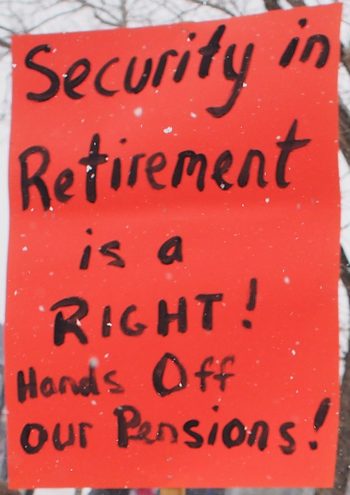 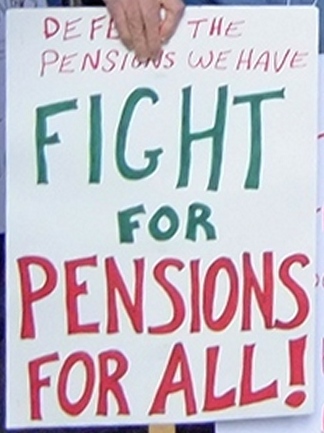
Fight
for
Security
in
Retirement!
• Withdraw Bill C-27! No to Attacks on Defined
Benefit
Pensions!
• Congratulations to CEZinc Steelworkers!
• Quebec Aluminum Workers Overwhelmingly
Reject Two-Tier Pension Plan
- Interview, Clément Masse, President, United Steelworkers Local
9700
• Canadians Demand a New
Direction to
Guarantee Defined Pensions
for All - K.C.
Adams
Fight for Security in Retirement!
Withdraw Bill C-27!
No to Attacks on Defined Benefit Pensions!
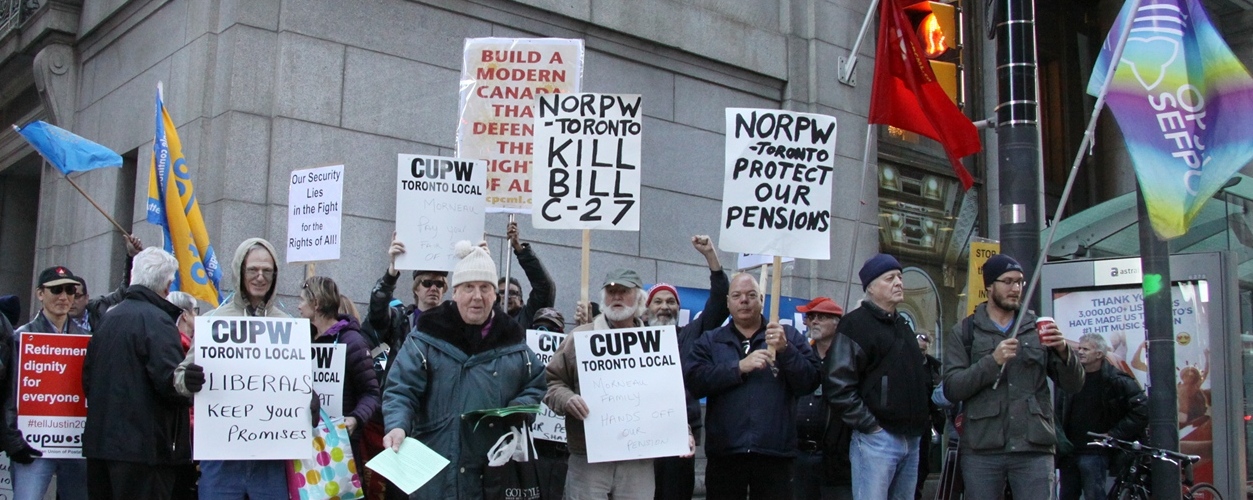
Retired and active postal workers from the Toronto and
Scaborough
Locals of the Canadian Union of Postal Workers (CUPW), workers from
other unions and their allies held a rally and picket in Toronto on
November 28 to denounce the Liberal government's attacks on
workers and retirees and to demand that Bill C-27 be scrapped.
Bill C-27, if passed, will remove the issue of pensions
from postal
workers' upcoming negotiations. Workers will have no say in the kind of
pensions they have, as the police powers of Bill C-27 will replace
negotiations with state dictate. The government through Bill C-27
will direct Canada Post to unilaterally replace the defined benefit
plan with a target benefit plan.[1]
The action took place outside the annual meeting of the
Institute of Corporate Directors at which Liberal Finance Minister Bill
Morneau was the keynote speaker. Bill C-27 would reap windfall profits
for Morneau Shepell -- the
pension
consultancy company owned by the Morneau family. Protesters denounced
this as a blatant conflict of interest and "highway robbery."
 Jean-Claude Parrot,
President of the National
Organization of
Retired Postal Workers (NORPW), and a former National President of
CUPW, pointed out that postal workers have historically fought to
defend their rights and those of all workers to live and work with
dignity. He stated that the Harper government had planned to convert
postal
workers' defined benefit pension plan to a defined contribution plan
but postal workers mobilized to prevent this. He pointed out that
during the 2015 federal election the Trudeau Liberals
promised
not to touch government workers' pension plans, but one year after
coming to power they tabled Bill C-27. Parrot stressed that postal
workers'
fight for defined benefit pensions is one with the fight of all workers
for a secure retirement and called for continued unity of workers from
all sectors. Jean-Claude Parrot,
President of the National
Organization of
Retired Postal Workers (NORPW), and a former National President of
CUPW, pointed out that postal workers have historically fought to
defend their rights and those of all workers to live and work with
dignity. He stated that the Harper government had planned to convert
postal
workers' defined benefit pension plan to a defined contribution plan
but postal workers mobilized to prevent this. He pointed out that
during the 2015 federal election the Trudeau Liberals
promised
not to touch government workers' pension plans, but one year after
coming to power they tabled Bill C-27. Parrot stressed that postal
workers'
fight for defined benefit pensions is one with the fight of all workers
for a secure retirement and called for continued unity of workers from
all sectors.
Peter Whitaker, speaking for NORPW, stated that retired
and active
postal workers are not alone in defending workers' pensions. He cited
the courageous battle waged by the steelworkers in Hamilton whose
pensions and benefits were misappropriated by U.S. Steel using the Companies' Creditors Arrangement Act
(CCAA). He stated that the Public Service Alliance of Canada and other
unions are also demanding "Hands Off Our Pensions!" Whitaker noted that
the Trudeau Liberals appointed Morneau as Finance Minister knowing that
he and his company had long agitated for governments to pass
legislation to convert defined benefit pensions to target benefit
pensions which allow companies like Morneau Shepell to make a killing.
He called on everyone to join in the fight to defeat the
Liberals' anti-worker Bill C-27.
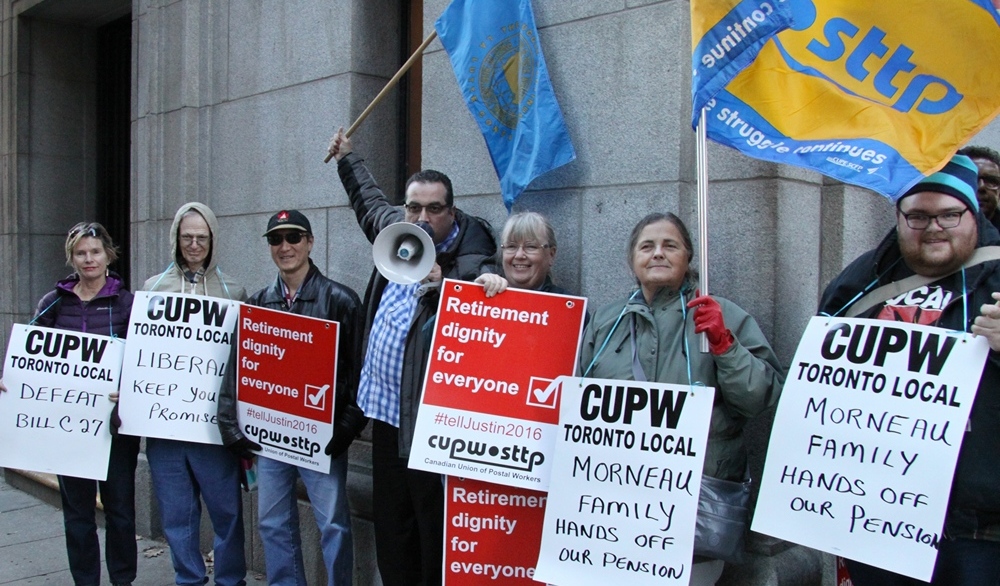
Other speakers also denounced Bill C-27 and called for
the
resignation of Morneau and Trudeau, and the repeal of this anti-pension
bill. They pledged to take collective action to unseat the Liberals in
the next federal election in 2019.
The action received wide support from passers-by, many
of whom stopped to find out more about the action and
to offer their support.
Note
1. For further information on Bill
C-27 see Workers'
Forum, September 18, 2017.

Congratulations to CEZinc Steelworkers!
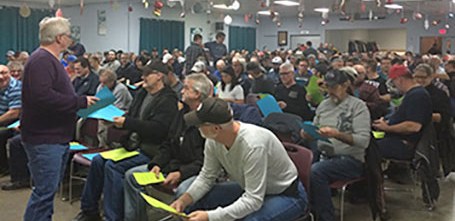
Meeting of steelworkers from CEZinc refinery in
Salaberry-de-Valleyfield, November 25, 2017
Workers' Forum joins with all workers and their
allies in
extending our heartiest congratulations to CEZinc steelworkers in
defending their rights! Members of United Steelworkers/Syndicat des
Métallos Local 6486 at the CEZinc refinery in
Salaberry-de-Valleyfield,
with the active assistance of many community and other
allies, have successfully defended their pension plan for current and
future workers.
On strike for nine and a half months, the 371
CEZinc steelworkers
have maintained their just and honourable position to defend their
pension plan from the attacks of those who own and control the
refinery, the Noranda Income Fund and global monopoly Glencore. The
steelworkers' position in defence of the right of current and future
workers to a just claim on the value they produce and to retire in
dignity won the active support of the working class and others across
Quebec, Canada and internationally. Their strike began on
February 12,
and continued until the ratification vote to accept the new contract on
November 25, which contains no concessions regarding
the pension plan.

Quebec Aluminum Workers Overwhelmingly
Reject Two-Tier Pension Plan
- Interview, Clément Masse,
President, United Steelworkers Local 9700 -
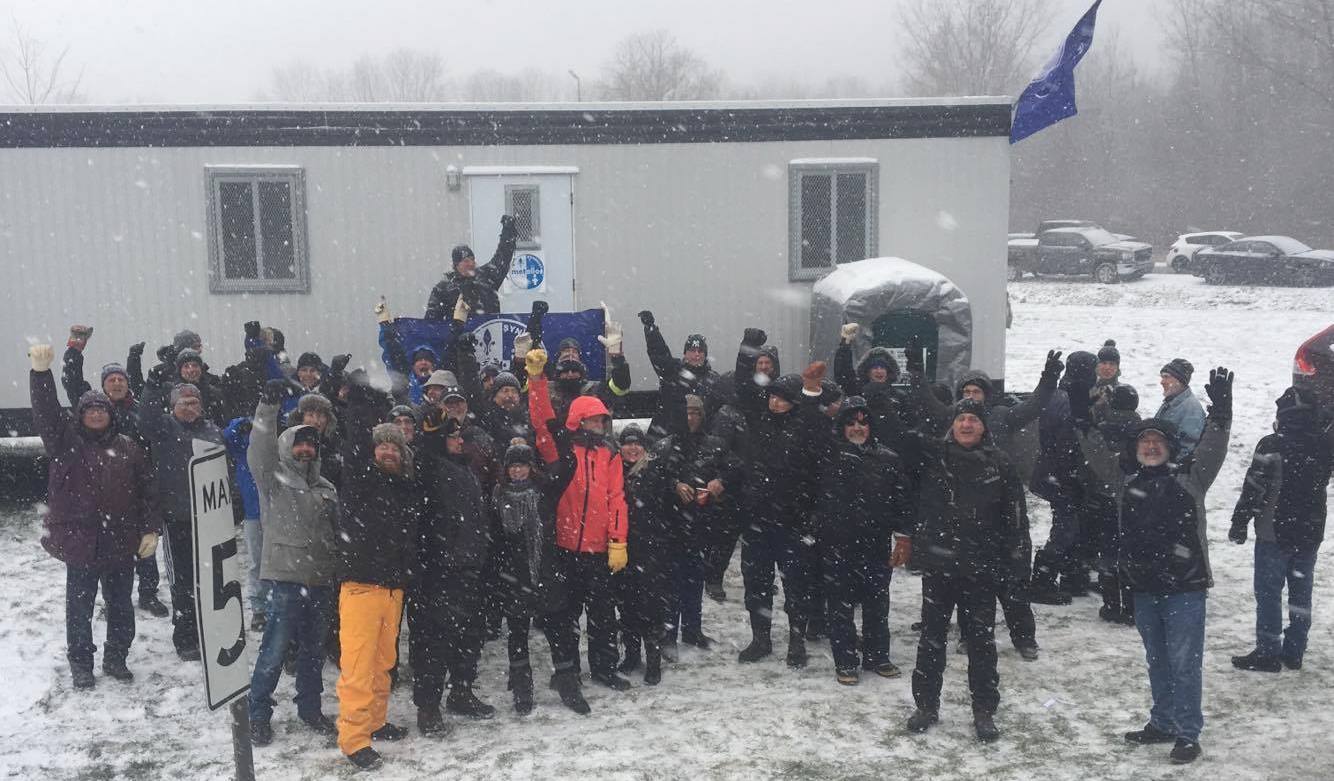
Workers at ABI plant in Bécancour following vote to reject
company offer,
November 22, 2017.
On November 22,
the day their collective agreement came to an end, the 1,030
workers at the ABI aluminum plant in Bécancour overwhelmingly
rejected the company's offer to introduce a two-tier pension plan and
create two-tier working conditions by dismantling existing contractual
arrangements with respect to job transfers
and mobility. The workers decided not to go on strike at this time and
the employer has not locked them out. There are talks going on right
now in the presence of a mediator. Posted below is an interview with
Clément Masse, President of USW Local 9700 representing the
ABI workers.
***
Workers' Forum: How many workers
are there at the ABI smelter, and what do they produce?
Clément Masse: At the ABI
plant, we produce primary aluminum in the form of ingots, billets and
plates. The plant has a production of about 450,000 tonnes per
year. It is owned in partnership by Alcoa (75 per cent) and Rio Tinto
(25 per cent). We are 1,030 unionized workers and management has
about 100 people.
The union members are divided into three units, all of which are part
of USW Local 9700. These are: the production unit, which
comprises about 950 workers, the office and technical unit, and
the lab technicians' unit which comprise about 50 and 21
people respectively.
The ABI plant has a big impact in the region
economically. The plant is located on the south shore of the St.
Lawrence River in Bécancour, but it has an impact throughout the
region, even on the North Shore because 75 per cent of ABI
employees live on the North Shore. There is no big city on the
Bécancour side while the nearest town is
Trois-Rivières on the North Shore. People often will prefer to
live on the North Shore because of the services for children and the
schools. The plant provides work for several small businesses and
contractors. It must also be said that about 1,000 workers with an
average wage of $42 to $43 per hour have an impact on the
region.
If there was to be a work stoppage here, the economy of the region
would certainly feel it.
WF: You mentioned in a statement
that negotiations are at an impasse on the issue of the pension fund
and the job mobility issues in the plant. Can you tell us more about
that?
CM: We went into early negotiations
starting in January. We had done a lot of work. We had discussions with
the employer but the negotiations stalled on the pension plan. The
employer wants to establish a two-tier plan and put that proposal on
the table. We said "no way." The early negotiations ended there in the
spring.
We started official negotiations in September -- in the
official negotiating period of 90 days before the end of the collective
agreement on November 22, one minute before midnight. We are now
without a contract. In September, we immediately asked the employer
what their stand was on the issue of the pension plan. Their position
was and still is to establish a new pension plan for new hires. This
put a big gap between the positions of the two parties. On top of that,
the employer has a lot of demands regarding job transfers and mobility
issues.
There are many people who are retiring in the plant.
The plant opened in 1986 and almost all of us were hired at the
same time between 1986 and 1990. That's when the hiring boom
at ABI happened. Now we are at a point where everyone is retiring.
Since 2012, our last contract, there have been almost 400
hires to replace those who retired, and there will be almost 400
more in the next four to five years. Virtually the entire plant is
going to
be filled with new people within 10 years.
The employer's demand is to maintain the current regime
for those who are currently employed, and to introduce a member-funded
pension plan (MFPP) scheme for new hires. We are opposed to having two
pension plans for our workers.
Our current plan is a defined benefit plan. The other
is an MFPP, and in the employer's offer there are no details about the
terms of the plan. All the employer says is that they would contribute
to the plan and the rest would be built as we go, for example, what
would be the workers' contribution, what would be the retirement age,
and so on.
What we do know, however, is that with the MFPP plan, the worker
assumes the risk. In our defined benefit plan, if there is not enough
money in the plan, it is the employer who has to make up the
difference. In the MFPP it
is the workers who have to do so and bear the risk. The only obligation
of the employer is to pay their contribution,
which
is
fixed. This is how an MFPP is defined by law.
The employer also has a lot of demands on job transfers
and mobility issues. We do not want to go there because they want to
attack our working conditions. In the proposal they made to us and
which was rejected massively by our members, there is no respect for
seniority. They want to be able to hire people directly to fill
vacancies.
They
want to freeze people for four years in the specific jobs they are
doing, with workers not being able to apply for and get other positions
in the plant when there are vacancies.
So we are stuck on the issues of the pension plan and
job transfers.
WF: How does the union argue
against these two demands from ABI owners?
CM: As a matter of principle, we do
not agree that there should be two regimes for workers. In our view,
everyone belongs to the same regime and we are moving forward together.
We have always fought against two-tier conditions. The same thing
applies to working conditions. We have provisions whereby when there is
a vacancy the employer is obliged to post the position internally. If
the position is not filled it has to go into hiring and the person who
is hired is part of the union and works on the same terms as everyone
else. Someone who is hired and does the same job as another worker
makes the same wage. We have been fighting all the time so that working
people have the same conditions. In 2004 when we went on strike, it was
for that too.
We have explained to our members the danger of having
two pension plans in our agreement. It would divide us. What would we
do if in four years, the 400 new people have a different pension
fund? In the membership meetings, there would be conflicts between the
workers. It is between workers that disputes are going to take
place. The 400 new hires will say that we abandoned them when
we signed a new contract.
WF: The workers overwhelmingly
rejected ABI's offer on these two issues.
CM: The workers rejected the
employer's offer and gave a 97 per cent strike mandate and the
participation rate was 90 per cent. The room was packed. There
were a lot of young people, a lot of new workers. The largest unit,
the production unit, which includes about 950 workers,
voted 98 per cent against the offer
and for the strike mandate.
There has never been a membership meeting with so many
people in the life of the union at ABI. I've been working here
for 30 years and I've never seen anything like it.

Canadians Demand a New Direction to Guarantee Defined
Pensions for All
- K.C. Adams -
Join the working class in organized
actions to defend the pensions
we have
and fight for defined pensions for all!
Canadian pensions are under attack. The ruling
imperialist elite have launched a broad campaign to reduce the amount
of the new value workers produce that goes towards pensions. The
transfer of social wealth
from workers' pensions and benefits to private coffers of the rich in
the last 30 years is unprecedented, reversing the pension
guarantees the working class won in battles following World War II.
 The working class is
resisting the assault on the pensions it now has and fighting for the
right of all to a guaranteed retirement at a Canadian standard.
Campaigns are underway to expose and denounce the attack on pensions
and the parasitism and corruption of contracting out pension
administration and investment of workers' savings to third
parties with close connections to the ruling imperialist elite. The working class is
resisting the assault on the pensions it now has and fighting for the
right of all to a guaranteed retirement at a Canadian standard.
Campaigns are underway to expose and denounce the attack on pensions
and the parasitism and corruption of contracting out pension
administration and investment of workers' savings to third
parties with close connections to the ruling imperialist elite.
Organizations have come together to denounce and stop
the Trudeau/Morneau Liberal Bill C-27 that undermines public sector
defined benefit pensions and replaces them with savings funds with no
guaranteed pension benefits. Canadians are further incensed at the
blatant hypocrisy and corruption of Liberal Finance Minister Bill
Morneau
leading the assault on federal public sector and Crown corporation
pensions, such as at Canada Post. The company owned by the Morneau
family, Morneau Shepell, will directly profit from user fees to
administer the
so-called pension savings funds that will replace the defined benefit
pensions. Active and retired members of the Canadian Union of Postal
Workers,
the National Organization of Retired Postal Workers, and others in the
Public Service Alliance of Canada and their allies across the country
are determined to stop Liberal Bill C-27 and defeat this attack on
federally-administered defined benefit pensions.
Other organizations of the working class have united to
demand immediate changes in bankruptcy legislation, specifically the Companies' Creditors
Arrangement Act (CCAA) for large companies. The
present arrangement allows a form of legalized theft of what belongs to
workers by right in pension benefits and other promised
post-employment benefits.
 A recently released study
from the Canadian Centre for Policy Alternatives (CCPA) shows that
companies, such as the recently bankrupt Sears, can deliberately
degrade their defined benefit pension funds, transfer that money to
directors and shareholders instead, and then declare CCAA bankruptcy
and legally evade responsibility to make the
pension funds whole and capable of meeting the promised defined
benefits. A current NDP Member of Parliament and former Stelco
steelworker
from Hamilton, Scott Duvall, with the support and encouragement of the
working class has introduced a private member's bill to stop this
criminal practice of large companies, while the Trudeau Liberal
majority government and Conservative opposition do not support the bill. A recently released study
from the Canadian Centre for Policy Alternatives (CCPA) shows that
companies, such as the recently bankrupt Sears, can deliberately
degrade their defined benefit pension funds, transfer that money to
directors and shareholders instead, and then declare CCAA bankruptcy
and legally evade responsibility to make the
pension funds whole and capable of meeting the promised defined
benefits. A current NDP Member of Parliament and former Stelco
steelworker
from Hamilton, Scott Duvall, with the support and encouragement of the
working class has introduced a private member's bill to stop this
criminal practice of large companies, while the Trudeau Liberal
majority government and Conservative opposition do not support the bill.
CCPA Study: The Lion's Share -- Pension Deficits
and Shareholder Payments Among Canada's Largest Companies
Along with the Trudeau Liberal attack on
public sector pensions, the CCPA study reveals a trend has become
entrenched amongst large companies to eliminate defined benefit
pensions for new employees. Defined benefit (DB) pensions were designed
to guarantee pension benefits at a certain level. Their introduction
was a step towards
guaranteeing the right of all to a Canadian standard of living in
retirement. Before defined pension benefits came into being along with
the still inadequate Canada and Quebec Pension Plan, Canadian workers
had to rely on savings during retirement, which is a recipe for
poverty. The elimination of DB pensions and other post-employment
benefits
is a backward step to reliance on savings resulting in greater
impoverishment of seniors.
The CCPA study shows a steady decline in DB pensions,
which are being replaced with various forms of savings plans without
any guarantee of benefits in retirement. This trend is accompanied with
the companies involved no longer administering pensions as a
responsibility but rather contracting out the service to companies such
as Morneau
Shepell that charge a user fee, which comes directly from the pension
savings.
The CCPA investigation found that the employees of
only 39 of Canada's 60 largest companies traded on the stock
exchanges still have DB pensions. Those companies controlled $174
billion in DB pension assets in 2016. The combined private sector
pension assets in all of Canada's registered pension plans including
DB plans and all retirement savings plans such as company defined
contribution plans and RRSPs amounted to $537.39 billion
in 2016.

The DB funds can fall into a deficit if not replenished
with current revenue. DB plans promise a certain pension benefit and
must have enough money currently coming directly from the company's
accounts (balance sheet) or from the fund itself to cover all expected
pension benefits. If the company declares CCAA bankruptcy as in the
case of
Nortel, Sears and others, or the DB plan is taken off the balance sheet
through CCAA such as at Stelco, or wound up for whatever reason, then
the existing assets in the DB fund must be enough to maintain the
promised pension benefits until all members of the plan pass away.
Having enough money in the pension fund is never the case since a
company planning bankruptcy or to take the DB pension plan off the
balance sheet or wind it up wants to use an existing pension fund
deficit as one of the excuses for doing so and use available revenue
for other purposes. The companies usually stop putting enough revenue
in the fund well before the collapse. The revenue instead goes into the
pockets of those who own and control the company.
The CCPA study found that the DB pension funds of
the 39 largest companies held an aggregate deficit of $10.8
billion in 2016 up from a $6.6 billion shortfall
in 2015. Instead of putting cash in the pension funds in 2016
to make them whole or at least stop the deficit from becoming worse,
those
companies collectively decided to use available revenue their workers
produced to pay executives and directors their huge claims and to give
shareholders $46.9 billion.
Over the past six years those 39 DB pension funds
have consistently been in deficit yet those in control paid shareholder
dividends at an increasing combined amount from $31.9 billion
in 2011 to $46.9 billion in 2016. Those 39
companies directed four times the amount of revenue towards
shareholders
than the amount needed to fully fund their DB pension plans. The study
shows that 25 of those DB plans could have been fully funded with
less than one year's worth of payouts to shareholders. The shortfall
in 18 of those DB plans could be fully funded now with
just 13 per cent of what was paid to shareholders over the entire
six years.
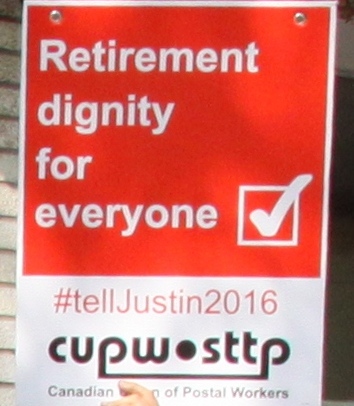 The study reveals what it
calls a "curious" situation in that the DB pension plans in the worst
shape with less than 80 per cent of the necessary funds to
maintain benefits in the event of a fund windup could be fully funded
with only 6 per cent of the shareholder payments since 2012. The study reveals what it
calls a "curious" situation in that the DB pension plans in the worst
shape with less than 80 per cent of the necessary funds to
maintain benefits in the event of a fund windup could be fully funded
with only 6 per cent of the shareholder payments since 2012.
The CCPA study writes, "[Federal and provincial DB plan
regulations] purposely ignored what employers were doing with corporate
earnings, as long as the required minimum required solvency payments
were being met. In other words, broader corporate decisions about
retained earnings are treated as a 'black box' for the purposes of
pension regulation. In certain instances, this could create a 'moral
hazard' in which firms had an incentive to direct cash flow to
shareholders and directors, leaving as little as possible in a plan
they could shed through eventual restructuring and insolvency."
(The "required payments" are routinely softened
such as with Ontario's "too big to fail" legislation allowing the
largest companies to delay their DB solvency payments. At Stelco, rules
were put in place upon the exit from CCAA in 2006 restricting
share dividend payments while the DB plan was in deficit but U.S.
Steel insisted this regulation be lifted, which the ruling elite
quickly agreed to do. -- WF Ed. note.)
Poisonous Deceit and Theft of Workers' Pensions
and Benefits
at Sears Canada Inc.
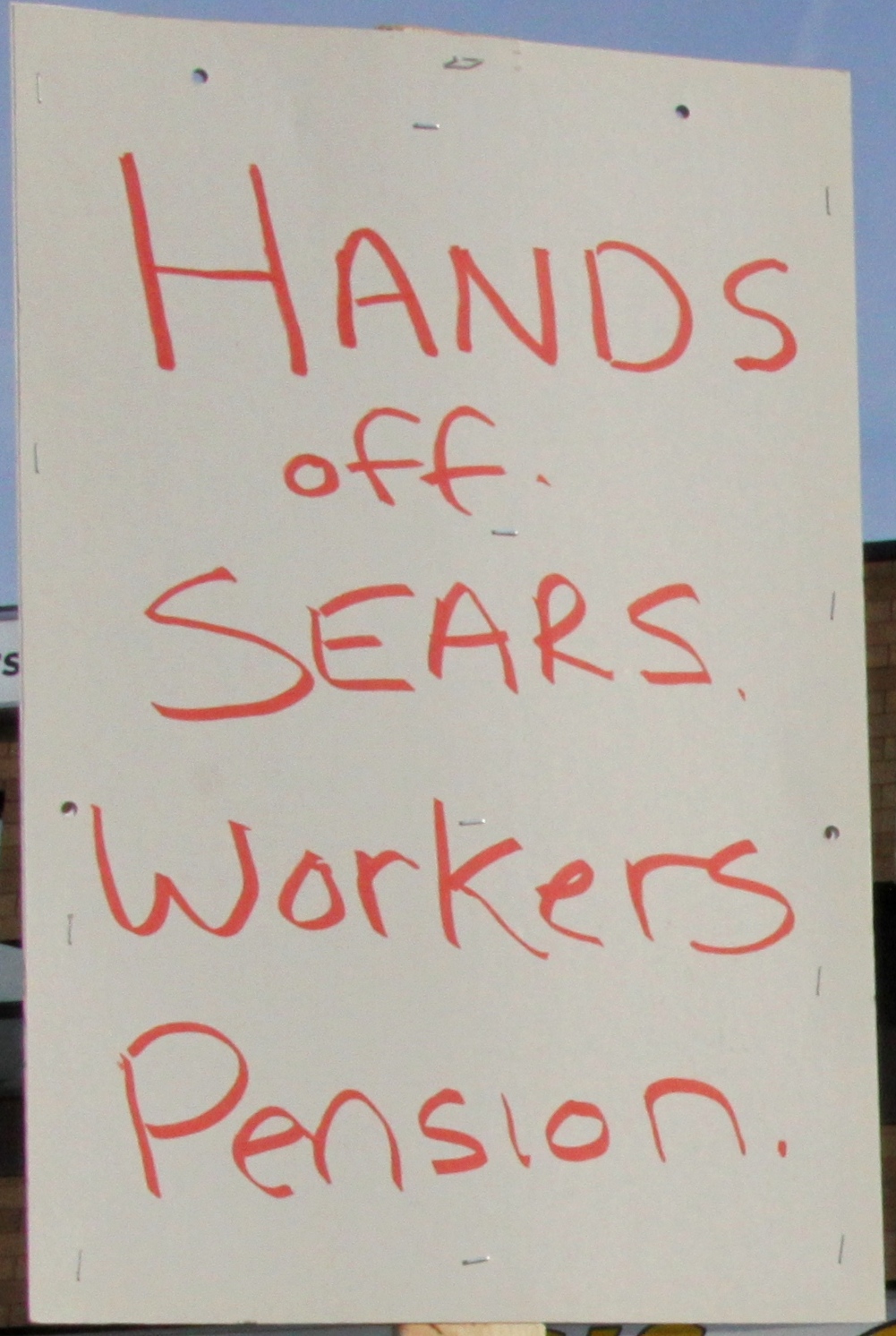
The CCPA study exposes the particular case of Sears
Canada, which shows the U.S. ownership taking value out of Canada while
letting the DB pension fund and the company itself badly deteriorate.
The CCPA study writes, "Canadian subsidiaries being
raided by American parents is an all-too-familiar story with Canadian
pensioners (not to mention suppliers and the courts) left to pick up
the pieces in bankruptcy. The recent news that Sears Canada will
shutter all remaining stores as a result of its insolvency leaves its
DB pension plan
with a $267 million funding shortfall on a wind-up basis.
"Since 2010, Sears Canada paid back $1.5
billion to shareholders in dividends and share buybacks. In other
words, Sears Canada paid back five-and-a-half times more to its
shareholders than it would have cost to entirely erase the deficit in
its DB pension plan.
"As Sears proceeds to liquidate its entire Canadian
operations, it will be Canadian retirees who are left to deal with that
decision."
Destruction of DB Pensions Means a Large Transfer
of Actual and Potential Value from the Working Class to the Not-Working
Class, Those Who Own and Control the Socialized Economy
The CCPA investigation found that over the
past 30 years, the number of workers enrolled in DB plans has
declined from nearly 50 per cent of the workforce to one quarter
with many of the remaining workers with DB plans concentrated in the
public sector. Three million workers in the public sector are members
of DB
pension plans with another one million workers in the private sector.
Less than one in 10 workers in the private sector now has a DB
plan. The next target of the ruling imperialist elite not surprisingly
is the public sector. The federal Trudeau/Morneau Liberal government
has unleashed a direct attack on public sector and Crown corporation
DB plans with its Bill C-27, which workers are determined to stop.
Almost all new pension plans today in the private
sector are of the defined contribution (DC) savings plan variety where
the pension benefit payments upon retirement are uncertain to say the
least and can soon run out altogether. Many companies that still have
DB plans are restricting entry of new employees into them. Many workers
with
pension savings plans, when they fall into difficulties beyond their
control such as unemployment, injuries or serious illness, often cash
in their DC or other savings plans to make ends meet in the present
leaving themselves without any pension income beyond the wholly
inadequate Canada Pension Plan and Guaranteed Income Supplement.

The CCPA study writes, "The trend away from DB pensions
towards DC schemes is part of a wider redirection of corporate earnings
away from workers and towards shareholders. This process reflects a
change in corporate thinking over the past several decades that seeks
to better align executives' decision-making with shareholder interests,
at
the expense of other corporate constituencies like labour."
The attacks on DB pensions are a feature of the ongoing
class struggle between the working class and the not-working class,
those who own and control the basic sectors of the socialized economy
and state, over the aim and direction of the economy and how to use the
value workers produce. The CCPA study clearly shows that the problems
surrounding defined benefit pensions are not a result of lack of money
but one of aim and which social class has control over the economy and
state and the power to direct the value workers produce to serve its
aim.
For the working class, the struggle to defend and
broaden its claims on the value it produces forms part of its immediate
or tactical aim in the class struggle with the not-working class. The
long-term or strategic aim of the working class is to seize control of
the entire value it produces for distribution to meet and guarantee the
well-being and
security of all from birth to passing away, to ensure the uninterrupted
extended reproduction of the economy through harmonizing the existing
socialized means of production with socialized relations of production,
and to provide the necessary value for the general interests of society
to open a path forward to the complete emancipation of the
working class and elimination of social classes.
The defence of the pensions workers have, and the fight
for defined pensions for all, form part of the tactical class struggle
to raise the standard of living of all with improved wages, benefits,
pensions and working conditions for all workers, to stop paying the
rich and for increased investments in social programs.
How to wage this class struggle successfully is a
matter of learning warfare through warfare, through organizing the
practical politics of the working class and mobilizing workers to
engage in actions with analysis in defence of their rights and claims
on the actual and potential value they produce. An important feature of
the tactical aim of the
working class to defend its rights in the here and now is to organize
and strengthen its independent institutions, politics and voice. Join
the independent institutions and organized class struggle of the
working class for its tactical and strategic aims!
Workers' Forum is a voice for the working class
to advance its tactical and strategic aims. Read, discuss, write for
and distribute Workers' Forum.
(To read CCPA's complete report on pensions click here.)

PREVIOUS
ISSUES | HOME
Website: www.cpcml.ca
Email: office@cpcml.ca
|

